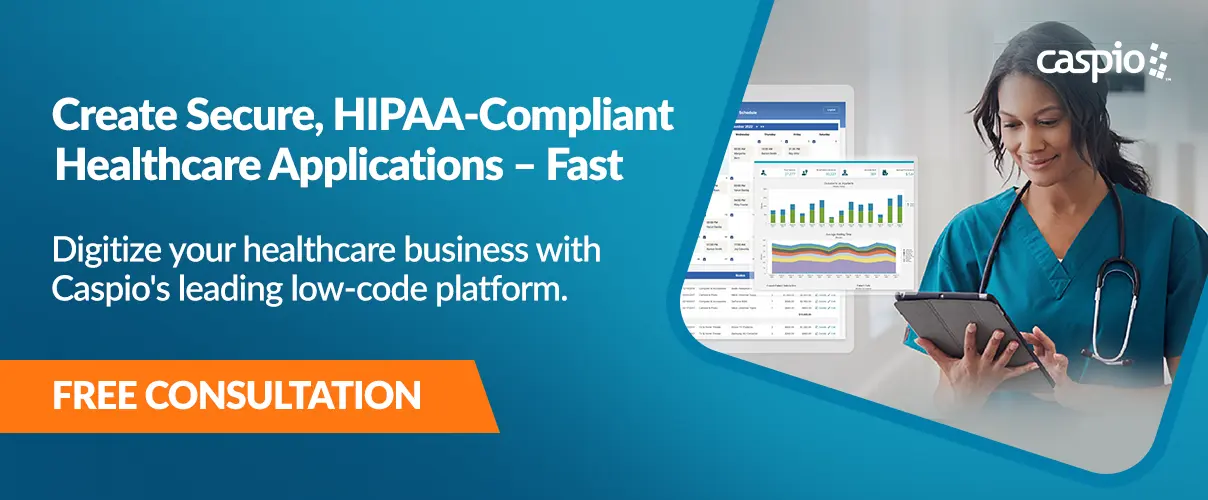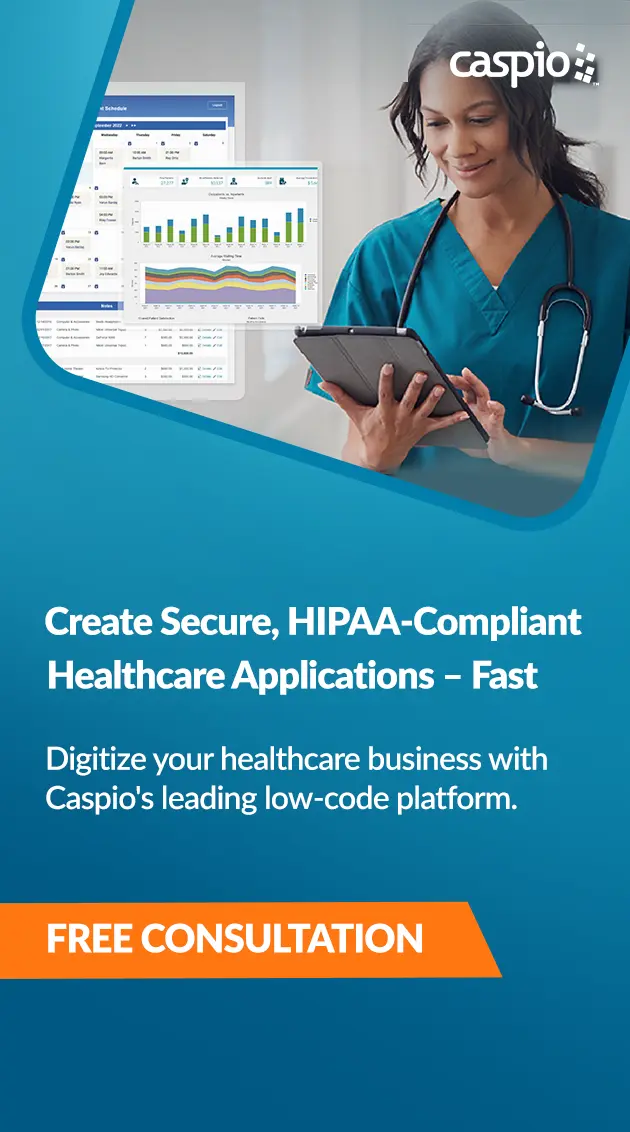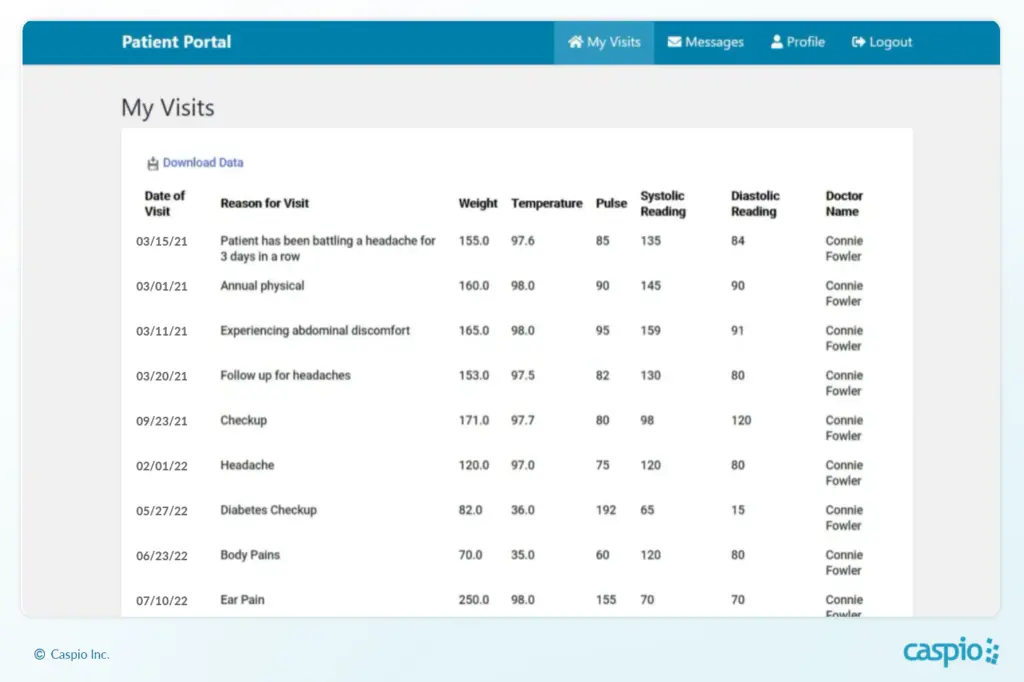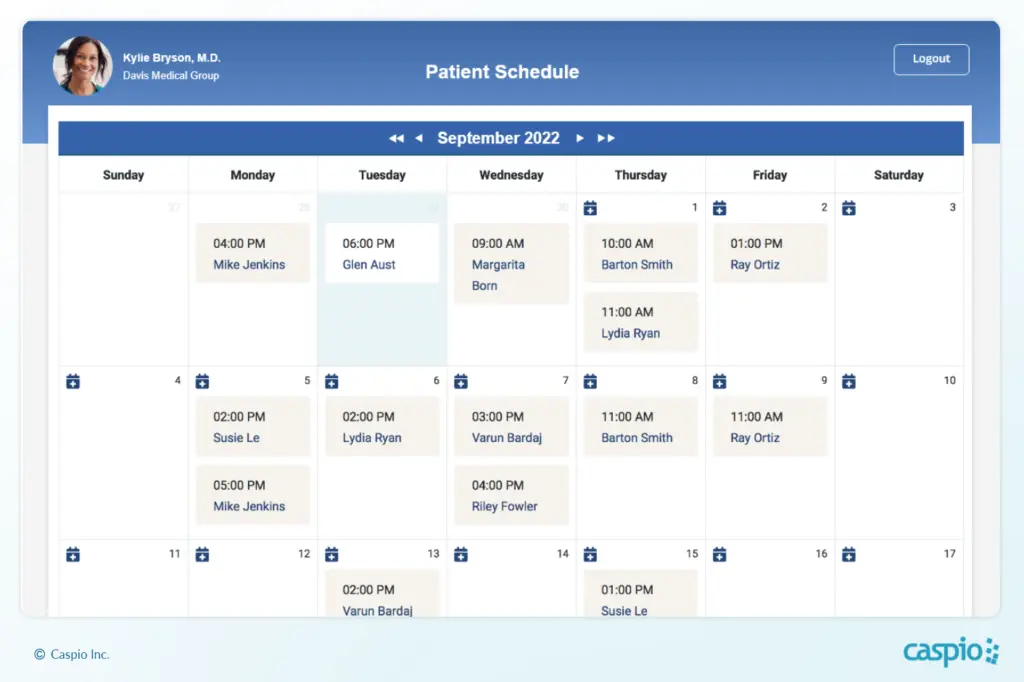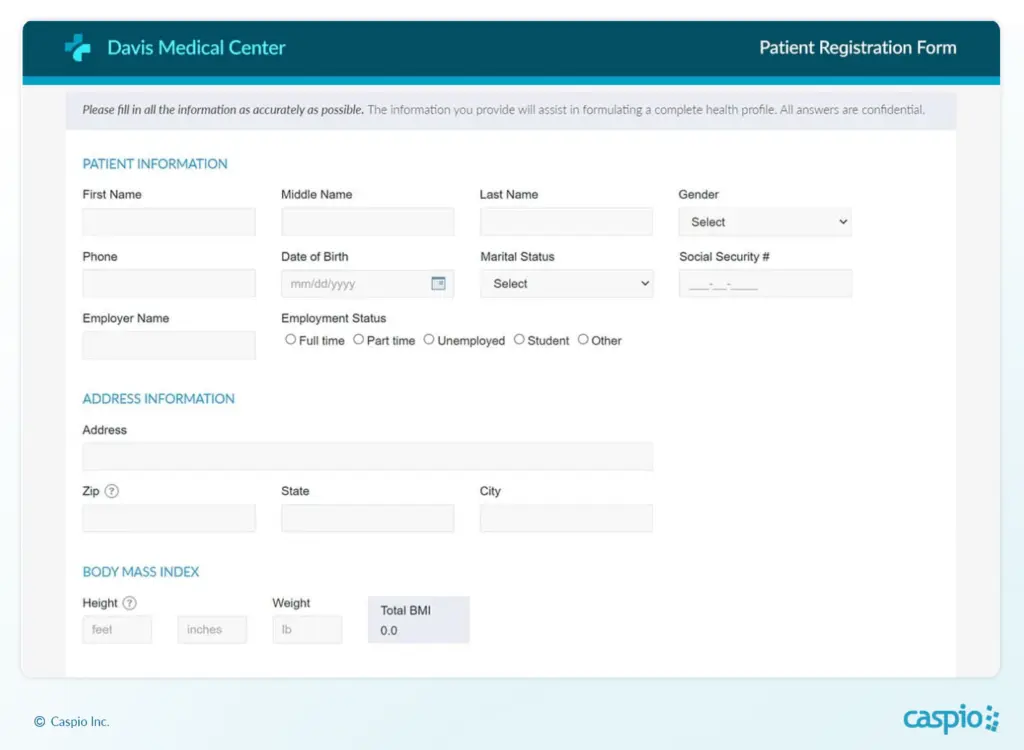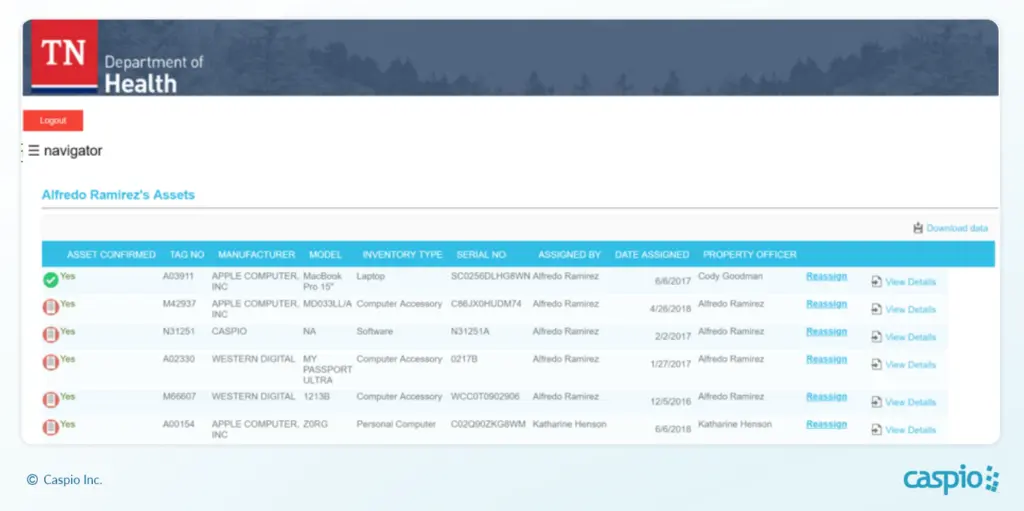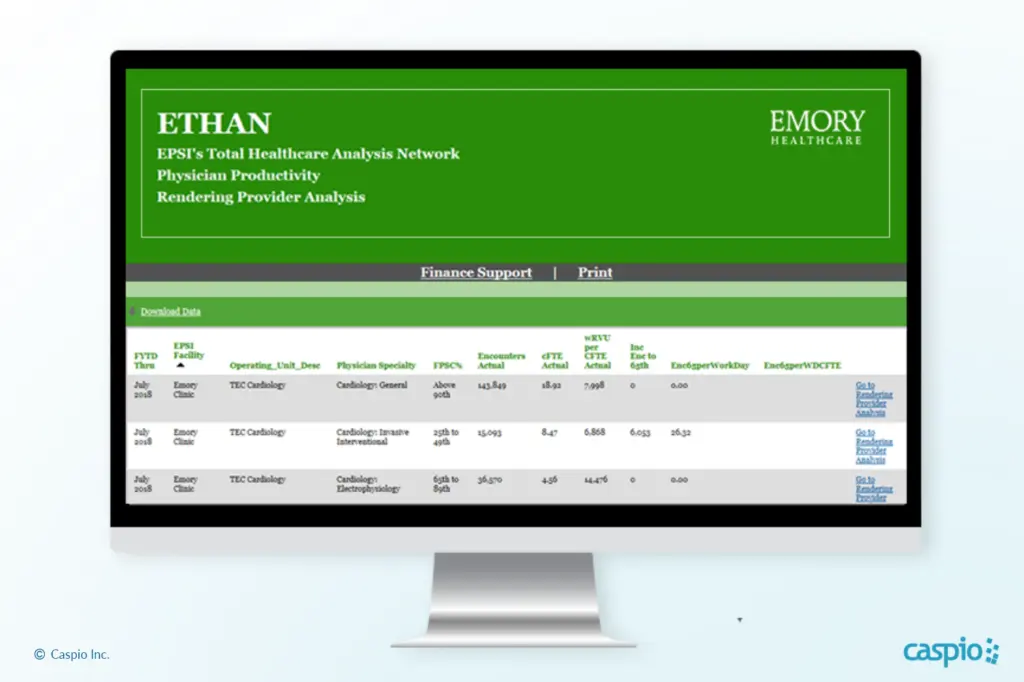How to Leverage Low Code in Your Healthcare Business
October 21, 2022
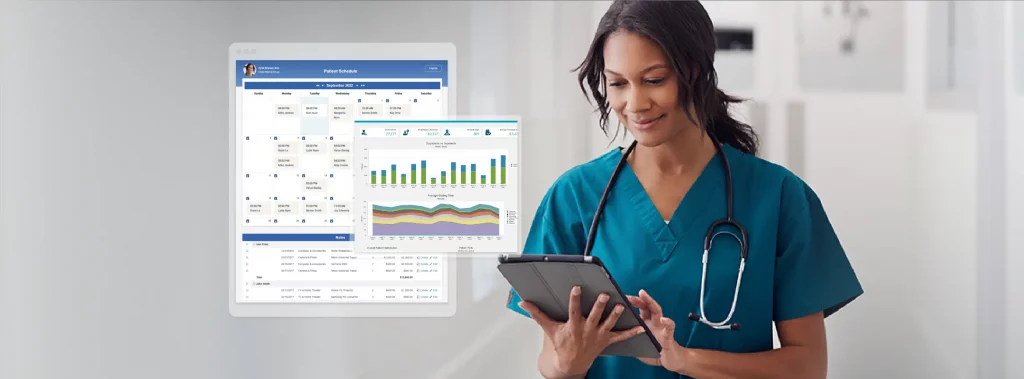
It’s never been more critical for healthcare providers to pivot to digital patient care. However, supporting digitization requires developing custom cloud-based software – a traditionally complex and costly initiative, even for businesses with a sizable IT department.
Amid talent and budget shortages, healthcare providers are turning to low-code development to bridge the gap.
Learn how you can create powerful HIPAA-compliant software with little to no coding.
The Struggles of Digitizing Healthcare Processes
During the height of the pandemic, companies worldwide pivoted to digital-centric models; some eliminated their physical business.
Healthcare providers, however, didn’t have that luxury.
For continuous patient care, healthcare providers instead expanded telemedicine services. McKinsey & Company estimates that telehealth use has grown 38x since the pandemic started. And while many video-conferencing tools were available, it’s the underlying operational processes that make telemedicine difficult to fully digitize. Think of appointment scheduling systems, physician directories, secure patient databases and other related applications.

CHRONIC PAIN: Healthcare providers face IT budget and resource constraints as the patient preference for cloud-based services grows.
Beyond patient experience, healthcare providers also require operations and admin software for inventory management, invoice and collection, staff onboarding and more. Other health facilities and departments need laboratory management software, clinical data management software and R&D databases, to name a few.
On top of that, healthcare organizations that rely on legacy systems struggle with the lack of proper interoperability, preventing the seamless transfer of data from one tool to another – resulting in time-consuming and often erroneous data entry and processing.
Most importantly, healthcare organizations need to ensure HIPAA compliance in their digital tools to secure protected health information or PHI.
With limited IT resources, healthcare providers cannot quickly create cloud-based custom applications that are secure, reliable and scalable.
Why Healthcare Providers Turn to Low Code
What is low-code development?
Low code uses a visual development approach. Professional software developers or tech-savvy business users leverage drag-and-drop and point-and-click tools to build their applications instead of writing code. As a result, they create custom healthcare applications faster than traditional development methods.
Healthcare organizations with limited development resources use low code to empower non-IT staff to participate in application building. By combining their knack for adopting new tools with their in-depth knowledge of unique departmental workflows, healthcare professionals gain the ability to create applications that meet their exact requirements – and do it with minimal to no coding.
Healthcare IT teams, on the other hand, use low code to augment their talent shortage and meet the software demands of the organization in a faster, more cost-effective manner.
Low code, therefore, democratizes software development for healthcare organizations by allowing both IT and non-IT staff to build applications faster.
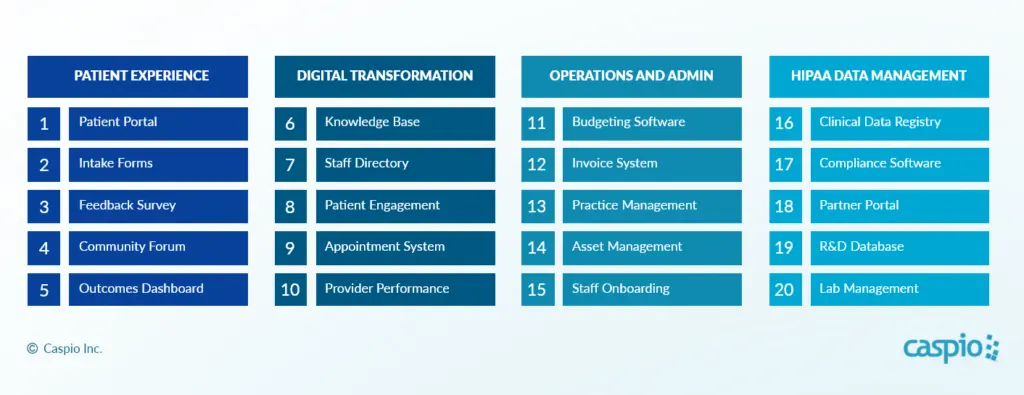
A DOSE OF DIGITAL: Use low code to turn manual processes into digital workflows that encompass all key aspects of your healthcare business.
What Healthcare Businesses Need in a Low-Code Platform
Caspio, the world’s leading low-code platform for building data-centric applications, enables healthcare organizations to create tools that help them digitize patient experiences, admin and operations, and other areas of the business.
Here’s what you can expect from Caspio’s award-winning platform:
Visual Development Interface
Empower both IT teams and business professionals to create applications using visual tools. Create forms, reports, charts and other applications quickly without having to build them from scratch using code.
Built-In Cloud Database
Centralize data and eliminate silos with an online database. Use visual database tools to input various data types, design table relationships, maintain referential integrity and more. As a Microsoft Gold Partner with SQL Server as our backend database, Caspio offers unparalleled performance, reliability and enterprise security.
Security and Compliance
On top of the platform’s built-in enterprise-grade security, Caspio also offers Health Insurance Portability and Accountability Act (HIPAA) compliance for providers managing protected health information. Caspio maintains Business Associate Agreements (BAAs) with vendors and offers BAAs for customers using our platform.
Fully Extensible Platform
Extend apps using HTML, CSS, JavaScript, SQL and REST API. Customize, expand and integrate based on your unique needs with our robust integration capabilities with popular services such as Zapier, PayPal, AWS, Google Drive and more.
Easy Deployment
Launch patient portals, telemedicine systems, patient forms and more without complex configurations involving IT. Caspio’s low-code platform lets you publish your apps on any website or intranet using simple deployment methods.
6 Ways to Leverage Low Code in Your Healthcare Business
Here are six use cases you can implement to make the most out of Caspio’s low-code platform and digitize your healthcare organization:
1. Create a Cloud-Based Patient Portal
Caspio allows you to construct online patient portals to help streamline patient management. Place patient medical histories in a unified database, show upcoming doctor’s appointments, and allow patients and providers to monitor and manage prescriptions — all in one central location.
2. Facilitate Online Appointments
Improve patient experience with appointment scheduling software. Create a standalone app or integrate scheduling management into your patient portal to allow patients to set dates for consultations. You can also enable SMS or email notifications to remind patients of upcoming appointments and minimize instances of no-shows and cancellations.
3. Launch Testing and Vaccination Software
The worst of the pandemic may have come and gone, but testing and vaccination remain integral to maintaining business continuity. Keep your workplace safe for patients and staff members by building an internal compliance system for tracking COVID-19 test results and employee vaccination status.
Snap Healthcare worked with Caspio to provide HIPAA-compliant testing and vaccination software to their extensive network of healthcare lab partners. They launched the sophisticated system in 60 days using low-code development. With traditional software development, it would have taken at least six to nine months. The launch resulted in a 50% increase in testing capacity and a 75% reduction in cost while maintaining 99% on-time results.
4. Build Patient Intake Forms
Digitize your data-gathering processes to save time, reduce human error and streamline the management of relevant files for patients and administrative staff. Use Caspio to quickly build a web-based patient intake form that transfers data to a knowledge base or physician dashboard in real-time.
5. Optimize Asset Management
Coordinate equipment utilization more effectively by building a custom inventory or asset management app. Provide up-to-date information on available beds or fast-track the distribution of medical equipment across multiple locations or departments by providing asset visibility to all authorized parties.
Tennessee Department of Health (TDH) had struggled with data silos across the organization, resulting in poor visibility of their assets. A proposed solution had been in development with their IT team for nearly 20 months at the time, costing them over $100,000. Using Caspio, TDH built an inventory control system that now manages the agency’s 20,000 assets – and they did it within two months. The app automatically sends emails to users twice a year to verify if they still have the registered asset on hand, providing the agency with 97% visibility of their assets.
6. Develop Reporting and Analytics Tools
Need financial reporting systems, analytics dashboards and similar data-centric applications? Build them with Caspio’s low-code platform. Caspio offers an integrated online database that you can use to centralize information from disparate sources, including Microsoft Access databases, Excel files and online repositories.
Emory Healthcare is the largest healthcare network in Georgia, with 11 hospitals, 2,800 physicians and 20,000 personnel spread across 250 locations. The group wanted to consolidate and analyze billing, claims and other financial data that impact patient experience. Using Caspio, Emory Healthcare successfully built a decision-support system that integrated multiple data sources, complementing their existing tools.
“Caspio increased our productivity time in analytics while decreasing our time spent in spreadsheets,” said Shane Wieberg, director of decision support at Emory Healthcare. “We now deploy real-time reporting applications instantly available across the organization with built-in security and access controls.”
Transform Your Healthcare Organization With Caspio
Healthcare providers benefit from robust, cloud-based applications that address their specific requirements. However, limited IT resources make it challenging to create custom healthcare applications. To bridge the gap, leverage low-code development.
Use Caspio’s low-code platform to digitize your processes and deliver better services to patients and partners.
Schedule a free project consultation with our platform specialists today and start exploring the possibilities.
